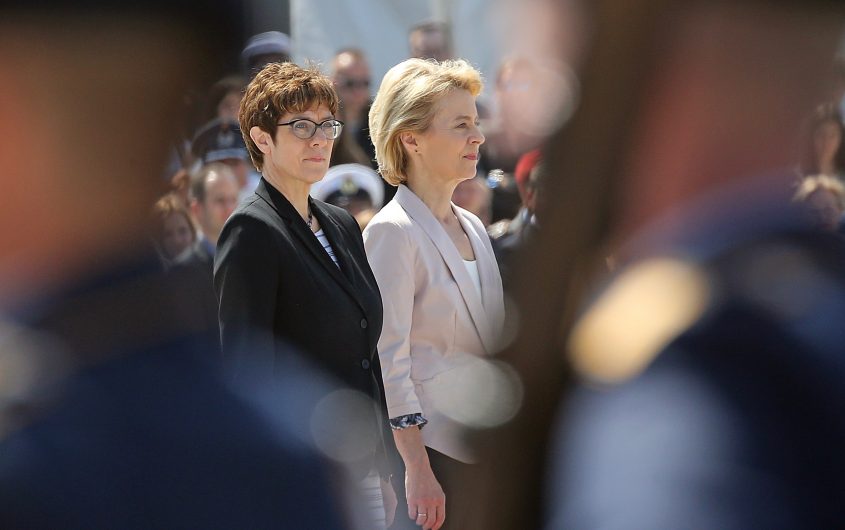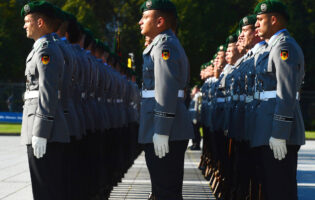
Wolfgang Kumm/picture alliance via Getty Images
Sitting in a Schleudersitz

Jackson Janes
President Emeritus of AGI
Jackson Janes is the President Emeritus of the American-German Institute at the Johns Hopkins University in Washington, DC, where he has been affiliated since 1989.
Dr. Janes has been engaged in German-American affairs in numerous capacities over many years. He has studied and taught in German universities in Freiburg, Giessen and Tübingen. He was the Director of the German-American Institute in Tübingen (1977-1980) and then directed the European office of The German Marshall Fund of the United States in Bonn (1980-1985). Before joining AICGS, he served as Director of Program Development at the University Center for International Studies at the University of Pittsburgh (1986-1988). He was also Chair of the German Speaking Areas in Europe Program at the Foreign Service Institute in Washington, DC, from 1999-2000 and is Honorary President of the International Association for the Study of German Politics .
Dr. Janes is a member of the Council on Foreign Relations, the International Institute for Strategic Studies, the Atlantic Council of the United States, and American Purpose. He serves on the advisory boards of the Berlin office of the American Jewish Committee, and the Beirat der Zeitschrift für Außen- und Sicherheitspolitik (ZfAS). He serves on the Selection Committee for the Bundeskanzler Fellowships for the Alexander von Humboldt Foundation.
Dr. Janes has lectured throughout Europe and the United States and has published extensively on issues dealing with Germany, German-American relations, and transatlantic affairs. In addition to regular commentary given to European and American news radio, he has appeared on CBS, CNN, C-SPAN, PBS, CBC, and is a frequent commentator on German television. Dr. Janes is listed in Who’s Who in America and Who’s Who in Education.
In 2005, Dr. Janes was awarded the Officer’s Cross of the Order of Merit of the Federal Republic of Germany, Germany’s highest civilian award.
Education:
Ph.D., International Relations, Claremont Graduate School, Claremont, California
M.A., Divinity School, University of Chicago
B.A., Sociology, Colgate University
Expertise:
Transatlantic relations, German-American relations, domestic German politics, German-EU relations, transatlantic affairs.
__
If Ursula von der Leyen and Annegret Kramp-Karrenbauer soon meet for a drink to discuss their respective new job prospects, one wonders which woman thinks she faces the greater challenge. As the new President of the European Commission, von der Leyen squeaked through the parliamentary vote with a nine-vote margin after a stormy debate. Despite her emotional appeal at the end of her speech—“Long Live Europe”—she faces a European Union full of centrifugal forces and dissensus, the looming unpredictable consequences of Brexit, and any number of antagonistic voices aimed from outside of Europe, including from Washington, DC.
Kramp-Karrenbauer is entering a job that almost never leads to the Kanzleramt—at the same time she is supposed to be preparing to run for that job. Given the enormous amount of work needed to deal with defense ministry deficits, that leaves little time for major impact. Part of that job is going to involve not only strengthening the infrastructure and fiscal capacity of the Bundeswehr, but also strengthening the morale of the troops. The question for AKK is: does she see this decision as a necessary, if temporary, stepping stone toward succeeding Merkel? If so, it could backfire when voters go to the polls.
It is not by accident that the job of defense minister is known to be what in German is called a “Schleudersitz,” as most ministers are dealing with long-term issues that are difficult to resolve under any government.
It is not by accident that the job of defense minister is known to be what in German is called a “Schleudersitz” (ejection seat), as most ministers are dealing with long-term issues that are difficult to resolve under any government. While most of those issues are shaped by domestic debates and by European arguments over money, management, and mission, Germany is facing a hostile set of demands from a major NATO ally in Washington. Trump has a special allergy when it comes to Germany’s defense budget and Berlin can count on continuing criticism no matter how long Trump stays in office. AKK would have to deal with that particular prospect while trying to forge common ground at home and in the EU. Trying to square those circles will be no less difficult than it has been for Merkel.
While von der Leyen will have a five-year term, AKK has a less certain path. She has to calculate how long the current coalition will last. The next elections are scheduled for 2021—unless the current coalition government implodes and causes an earlier date to be required. Much of that will depend on whether the Social Democrats stick with the coalition following three regional elections scheduled in the coming months. Should the party suffer another set of defeats, more pressure in the ranks could build to call it quits. Then a Candidate AKK would have to run in an election earlier, maybe in 2020, and if she wins, the next challenge would be to form a viable coalition government—no easy task, as we know from the past few cycles of post-election negotiations.
Both women have now been presented with new possibilities as well as potential pitfalls. AKK apparently decided that the opening at the defense ministry was an opportunity to strengthen her case to be Merkel’s successor even with a short tenure. AKK was the Minister-President of Saarland and sprang from there to become General Secretary and then head the CDU. Like her predecessor, she has no history of engagement in national defense policy.
She was also publicly on record to not want a cabinet position under Merkel, preferring to secure her own niche for the coming campaign. That was overtaken by events this past week. But if AKK is unable to make a dent on the defense ministry’s challenges in the time before the elections—whenever they occur—she will dampen her chances to present herself as a candidate.
Less than three weeks ago, von der Leyen was not even thinking about the position she will now inhabit. But when the sudden call came from Brussels, she answered the phone and saw a new opportunity to complete her political career. Von der Leyen went very far to underscore her passion for Europe in her speech to the European Parliament on July 15. She has a proven record of government leadership, having headed three cabinet positions in Merkel’s governments. By accepting this challenge, her career will now likely end in Brussels—not Berlin.
These two women have calculated a roll of the political dice in the belief that they can be successful in their respective ambitions.
These two women have calculated a roll of the political dice in the belief that they can be successful in their respective ambitions. Whether in Berlin or Brussels, they will face heavy headwinds. Both are experienced politicians, but neither are buoyed by strong popular support.
And that is why they may find that they will need each other. Von der Leyen and AKK are going to need to forge a plan to strengthen Europe in their respective roles.
From a political perspective, AKK will need to enhance Germany’s military capabilities by arguing that it also enhances European capability.
From a political perspective, AKK will need to enhance Germany’s military capabilities by arguing that it also enhances European capability. Arguing for more money cannot be based more on a genuflection to President Trump’s demands than on being in Germany’s own interest. Von der Leyen is well aware of that and can help echo the message now from Brussels.
As both the next defense minister and possibly the next chancellor, AKK could help President von der Leyen gather momentum with an effort to deepen and widen German capacities while opening more discussions with EU partners—especially with Paris—something that needs to be reset in any case.
Von der Leyen presumably will also hope that AKK would be a successful candidate as chancellor, thereby offering a longer-term partnership in pursuit of her agenda.
There remains a question as to whether and how these agendas can line up depending on the volatile political parameters both face in Brussels, Berlin, and on the global stage. Now that she has occupied the “ejection seat” at the Ministry of Defense, AKK will find that she will be even more subject to the “Game of Thrones” in Berlin, just as von der Leyen was. The unpredictability of the current governing coalition in Berlin can cause things to quickly change.
And von der Leyen’s thin election in Strasbourg is still to be followed by some difficult negotiations with the member governments of the EU as positions of influence are distributed throughout the network. The sources of support for her narrow margin of victory will be interested in what they can now expect or demand.
All things considered, both Kramp-Karrenbauer and von der Leyen are converging together on an enormous challenge at a most critical moment for Germany and Europe. They both are sitting in a version of a Schleudersitz which their respective predecessors have found hard to manage. Good luck to them both. They will need it.









